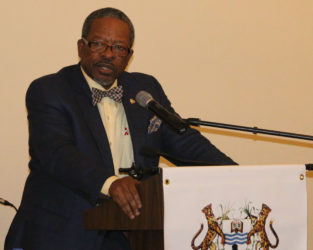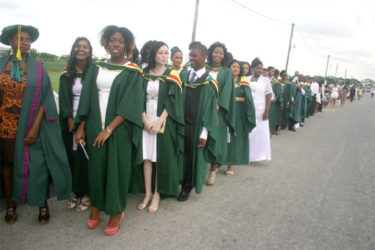The wholehearted support of the business community for the University of Guyana is unlikely to be forthcoming in circumstances where the institution provides little if any meaningful evidence of its worthiness of that support, Vice Chancellor Professor Ivelaw Griffith has said.
In an extended interview recorded at the institution’s Turkeyen Campus earlier this week (and which will be published in full in the Guyana Review later this month), Griffith said the falling away in the quality of UG’s output had raised searching questions about its automatic entitlement to the support of the private sector.
Asserting that there can be no expectation that the business community’s backing for UG can be unconditional, Griffith said such support had to be measured against the extent to which the university provided reciprocity for the private sector. “We have had the misfortune in Guyana that for more than a decade the neglect of the university has led to a certain decline in the quality that it has offered so that the people in the business community and in industry have not been fully thumbs up with what we have put out,” he said. And while he conceded that it was not “comforting” for a Vice Chancellor to make such an assertion, Griffith said it had to be conceded that there were “issues with the quality of what we have been putting out.”

At various periods in the history of the 55-year-old institution there have been a succession of collaborative initiatives with various businesses and business support organizations ranging from technical assistance to support for various faculties and for enhancing learning resources at the institution. The appointment of Professor Griffith as Vice Chancellor last year against the backdrop of critical resource scarcity and an uneasy relationship between the university’s administration and the student body has been attended by the unfolding of an ambitious plan to enhance the institutional capacity of the university. During the interview Griffith reminded that the rebuilding agenda included plans for the creation of a School of Entrepreneurship at Turkeyen, a development which he said would be characterized by an enhanced qualitative relationship between the business sector and UG.

Griffith insisted, however, that it was critical that UG provide the private sector with “reason to believe that when they give they will see a change in output. We have to give them reason to be confident that when they give they will see a changed output.”
And according to Griffith part of that “opportunity” reposed in allowing the private sector “to invest in the design of our programmes.” Accordingly, he disclosed that the feasibility study for the School of Entrepreneurship involved inputs from various business communities across the country including Corriverton, pointing to this collaborative approach as “a change in strategy” designed to “involve the private sector from the get go rather than to simply ask them for money to do things.”
According to the Vice Chancellor, initiatives to fashion a more cohesive relationship with the business sector was reflected in the infusion of co-sponsors including GUYOIL, CGX and Fly Jamaica in the recently inaugurated Turkeyen and Tain Talks. Additionally, he disclosed that the University of Guyana was in the process of crafting a partnership with Giftland. “We have got to reach out but we have got to be mindful that we have had a certain negative image. The negative image is that some of the people that we have put out have not been exactly stellar in their performance. Part of what we have to do is to ask them to help us build the quality. It is a multi-year journey. We’ve got to be inclusive. We’ve got to let them understand that they must have a voice.”
And in his broader assessment of the state of the university, Griffith said the institution had “issues related to the political environment. Some of what I have to say may make some people uncomfortable, but if we don’t face it we can’t fix it.”





